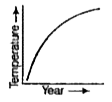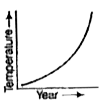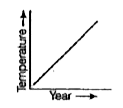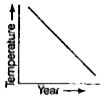In a particular climatic condition, decomposition rate is slower if
Detritus is rich in nitrogen
Detritus is rich in humus
Detritus is rich in sugars
Detritus is rich in lignin and chitin
The correct Answer is:D
To solve the question regarding the decomposition rate in particular climatic conditions, we need to analyze the options provided and understand the factors that influence decomposition.
1. Understanding Decomposition: Decomposition is the process by which organic matter is broken down into simpler substances. It is crucial for nutrient cycling in ecosystems.
2. Factors Influencing Decomposition: The rate of decomposition can be influenced by several factors including temperature, moisture, and the chemical composition of the organic matter (detritus).
3. Analyzing the Options:
- Option A: Detritus rich in nitrogen: Nitrogen-rich detritus tends to decompose faster because nitrogen is a key nutrient that supports microbial activity.
- Option B: Detritus rich in humus: Humus is already decomposed organic matter and generally supports further decomposition, so this would not slow the process.
- Option C: Detritus rich in sugars: Sugars are easily broken down by microorganisms, leading to a faster decomposition rate.
- Option D: Detritus rich in lignin and cellulose: Lignin and cellulose are complex compounds that are more resistant to decomposition. They require specialized microorganisms to break them down, which makes the decomposition process slower.
4. Conclusion: Based on the analysis, the decomposition rate is slower if the detritus is rich in lignin and cellulose (Option D). This is because these materials are more difficult for decomposers to break down compared to nitrogen-rich, humus-rich, or sugar-rich detritus.
Final Answer:
The decomposition rate is slower if detritus is rich in lignin and cellulose (Option D).
- Option A: Detritus rich in nitrogen: Nitrogen-rich detritus tends to decompose faster because nitrogen is a key nutrient that supports microbial activity.
- Option B: Detritus rich in humus: Humus is already decomposed organic matter and generally supports further decomposition, so this would not slow the process.
- Option C: Detritus rich in sugars: Sugars are easily broken down by microorganisms, leading to a faster decomposition rate.
- Option D: Detritus rich in lignin and cellulose: Lignin and cellulose are complex compounds that are more resistant to decomposition. They require specialized microorganisms to break them down, which makes the decomposition process slower.
The decomposition rate is slower if detritus is rich in lignin and cellulose (Option D).
Similar Questions
Knowledge Check
Which of the following statements regarding decomposition is false?
I. Warm and moist favours decomposition.
II. Decomposition rate is slower if detritus is rich in chitin and lignin.
III. Earthworm is detritus.
IV. Precipitation of soluble inorganic nutrients in the soil horizon as unavailable salt is called mineralization.
V. Detritus is the raw material for decomposition.AOnly IIBOnly ICOnly IVDOnlyVDecomposition rate is slow if detritus is rich in
ANitrogenBHumusCSugarsDLignin and ChitinThe temperature of a particular place is continuously decreasing. Which of the following graphs shows the condition?
A B
B C
C D
D
The temperature of a particular place is continuously decreasing. Which of the following graphs shows the condition?
View SolutionThe temperature of a particular place is continuously decreasing, Which of the following graphs shows the condition?
View SolutionThe rate of decomposition of detritus is accelerated
View SolutionThe rate of decomposition is controlled by
View SolutionThe rate of decomposition is controlled by
View Solution